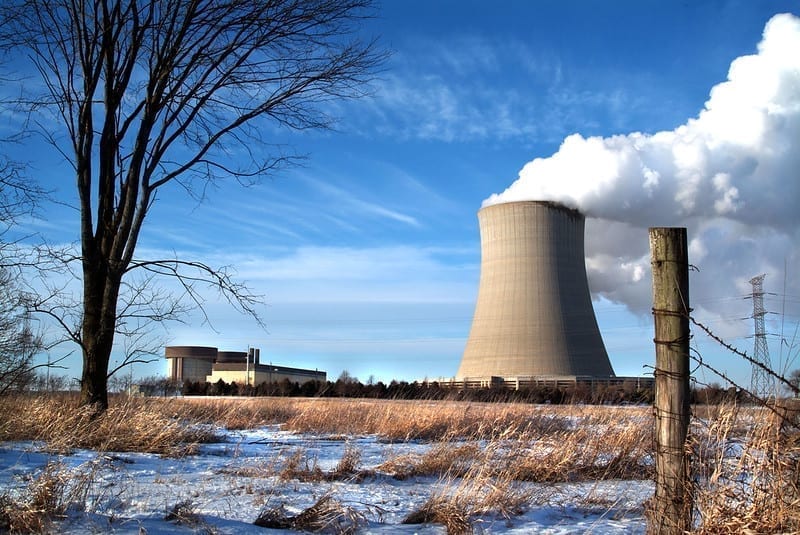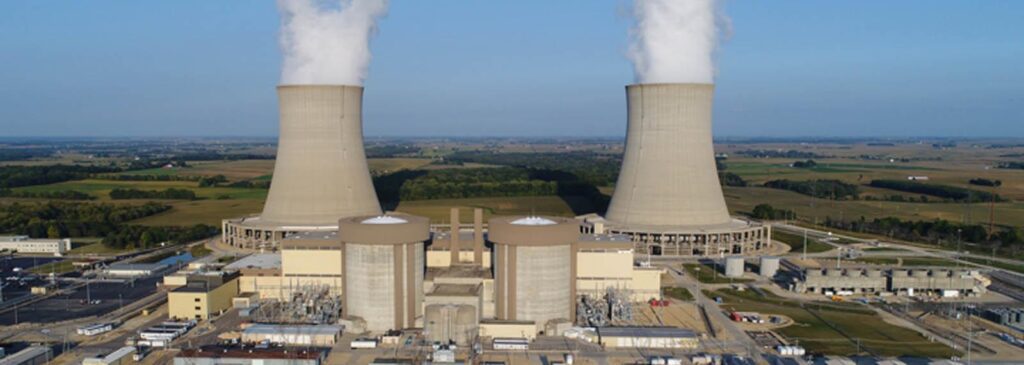Illinois Nuclear Plants Saved by Last-Minute Vote
The post Illinois Nuclear Plants Saved by Last-Minute Vote appeared first on POWER Magazine.

The Illinois Senate has approved an overhaul of the state's energy policy with an eye toward a carbon-free future, with a key part of the package keeping the Byron nuclear power plant operating just hours before Exelon, the parent of Commonwealth Edison (ComEd), said it would begin shutting down the facility.
Senators voted 37-17 on Sept. 13 to approve the package; 36 votes were needed for passage. The legislation is supported by Democratic Gov. JB Pritzker, and at least for now provides a reprieve for Byron and the state's other nuclear power plants. ComEd on Monday said it was now preparing to refuel the 2,300-MW Byron and 1,800-MW Dresden nuclear facilities; Exelon had submitted decommissioning plans for the two plants with the Nuclear Regulatory Commission last year. The utility said it also will move to immediately fill hundreds of vacant positions and resume capital projects required for long-term operation."
The bill passed Monday contains almost $700 million over five years in carbon mitigation credits for three Exelon plants, each built more than 40 years ago. Exelon had said it was prepared to begin closing Byron as early as Monday. The company said it was ready to shut down the Dresden plant in November, and had said its 2,350-MW Braidwood plant also was at risk of closure.
The Byron plant received a Top Plant award from POWER in 2020.
Carbon-Free Energy StandardWith Pritzker's signature, the energy bill makes Illinois the first Midwestern state with a binding 100% carbon-free energy standard by 2045. Clean energy advocates touted the legislation as making the state a leader in what they called an equitable clean energy policy.
Frankly, the people of Illinois, the people of our nation, of the globe can't wait for a clean energy future," the governor said after Monday's vote. The legislation means that coal-fired plants in the state would have to shut down over the next decade, while natural gas-fired plants would have until 2045. There's an exception for two publicly owned coal-fired facilities, the city-owned plant in Springfield, and the 1,600-MW Prairie State Generating Station in southern Illinois. The measure, though, sets targets for carbon emissions to be cut at those plants by 45% by 2035, and completely by 2045.
Illinois is the first state in the country with a climate action plan that centers equity and economic investments in clean energy to help communities that need them the most," said J.C. Kibbey, Illinois clean energy advocate for the Natural Resources Defense Council (NRDC), in a statement provided to POWER. The Climate and Equitable Jobs Act can serve as a national example of how a transition to clean energy can create jobs, protect communities and keep utilities accountable."
 The Bryon Generating Station in Bryon, Illinois, was set to begin shutting down Monday before state lawmakers passed an energy bill that will keep it open. The legislation provides a $700 million bailout for Byron and two other nuclear plants owned by Exelon. The Byron plant has operated outside of Chicago since 1985. Courtesy: Exelon
The Bryon Generating Station in Bryon, Illinois, was set to begin shutting down Monday before state lawmakers passed an energy bill that will keep it open. The legislation provides a $700 million bailout for Byron and two other nuclear plants owned by Exelon. The Byron plant has operated outside of Chicago since 1985. Courtesy: ExelonAt least five states, including Illinois, have set clean energy targets and have implemented credit programs to reward nuclear plants for providing zero-carbon electricity. Illinois in 2016 passed a law setting up 10 years of zero-emissions credits to Exelon's Clinton and Quad Cities nuclear plants.
The Biden administration and Congress have expressed interest in pursuing a federal program that would give nuclear power plants tax credits or other subsidies, recognizing nuclear power as the country's largest zero-carbon resource. The bipartisan Senate infrastructure bill includes a $6 billion four-year credit program for the nation's nuclear reactors. In addition, Democrats are looking to provide production tax credits for nuclear plants as part of their spending package for infrastructure and social programs.
Costs vs. BenefitsOpponents of the latest Illinois measure said its costs could outweigh the benefits to the state's electricity customers.
The fact is no one knows how much this piece of legislation is going to cost Illinois ratepayers, but we do know it will be borne by all ratepayers in the state," said state Sen. Don DeWitte, a Republican from St. Charles, on Monday. I guess what we're seeing and hearing today is that we'll just have to watch our friends across the aisle pass this legislation and then we'll find out."
The NRDC on Monday said the scope of reforms in the bill sets Illinois apart from other states with clean energy legislation, because it includes a wide range of provisions: changing the state's electric utilities' business models, fostering equitable economic and job growth in renewable energy targeted to diverse communities across the state, and supporting communities as they transition away from fossil fuels."
This is the kind of monumental shift that our country needs to make if we're going to stand a chance against climate change. Illinois is going to be the first state in the heartland to make this giant leap forward," said Kibbey.
Opponents Cite Higher Power BillsLawmakers who opposed the legislation have said it will result in higher power bills for Illinois electricity customers. Those higher bills would in part support the $700 million package for the Byron, Dresden, and Braidwood plants.
Negotiations on the legislation continued throughout the summer before Democrats in the Illinois House brokered a deal with Pritzker last week. The House on Sept. 9 approved the latest version of the bill on a bipartisan 83-33 vote. The legislation is supported by environmental groups and the state's labor unions.
The bill in its current form goes beyond a bailout for the three nuclear plants, putting an emphasis on moving Illinois toward 100% carbon-free energy by 2050 as coal-, oil-, and gas-fired power plants close in the coming years. Supporters of the legislation have said it is key in the effort to combat climate change.
Senate President Don Harmon, a Democrat from Oak Park, prior to Monday's vote said, We understand the dangers to our environment, the very real threat of climate change and the need to do something now to protect our future."
The energy package includes support for solar and wind energy development and electric vehicles. It also backs measures to recruit more minority workers, and minority-owned businesses, into the renewable energy industry.
Bribery ScandalThe legislation also addresses ComEd's role in a years-long bribery scandal centered on the utility's efforts to influence lawmakers in Springfield, the state capitol. ComEd in federal court last year admitted its part in the scheme, which included lobbying for a bailout for Exelon's Quad Cities and Clinton nuclear plants.
The energy package passed today includes provisions intended to prevent such activities in the future, with public officials being required to disclose whether immediate family members work for utilities. It also calls for the Illinois Commerce Commission (ICC), which regulates utilities in the state, to create a new position to monitor compliance and ethics at utilities. Those utilities also will have to employ ethics officers, who will need to file annual reports with the ICC.
The package also says ComEd cannot force the utility's customers for pay for any criminal penalties associated with the continuing federal investigation into the company's activities.
Supporters of the new energy bill have said it ends the practice of charging formula rates," which was pushed through the state legislature during the period of ComEd's now-discredited activities in Springfield. Those rates enabled ComEd to achieve higher returns, as customers paid higher rates to pay for upgrades to the energy grid. ComEd could charge those rates without asking for state approval for rate hikes.
Closing Coal- and Gas-Fired PlantsThe legislation sets a schedule to replace most coal-fired power generation in Illinois with renewable energy by 2038, and phase out natural gas-fired generation by 2045. Illinois will raise its Renewable Portfolio Standard to have at least 40% of the state's electricity come from renewable energy by 2030, and 50% by 2040.
The bill also includes a transition plan to help displaced workers at closing coal plants train for new careers, and to help communities losing coal plants with their tax revenue. Lawmakers on Monday said they also think it will bring additional clean energy investment and manufacturing to the state.
The package sets aside $80 million annually for equity-focused workforce and contractor development programs for renewable energy and energy efficiency. Funding within the legislation also includes $35 million a year for so-called under-resourced communities in Illinois, supporting business development grants, and creating training programs for workers to enter the clean energy sector.
This legislation started with a diverse set of environmental, labor, consumer advocates, and grass-roots organizations coming together to address the climate crisis," said Kibbey. Illinoisans recognized the writing on the wall and saw that we're running out of time. This comprehensive energy legislation is a path that we desperately need to fight climate change and to come back stronger after the economic downturn of the pandemic."
-Darrell Proctor is a senior associate editor for POWER (@POWERmagazine).
The post Illinois Nuclear Plants Saved by Last-Minute Vote appeared first on POWER Magazine.